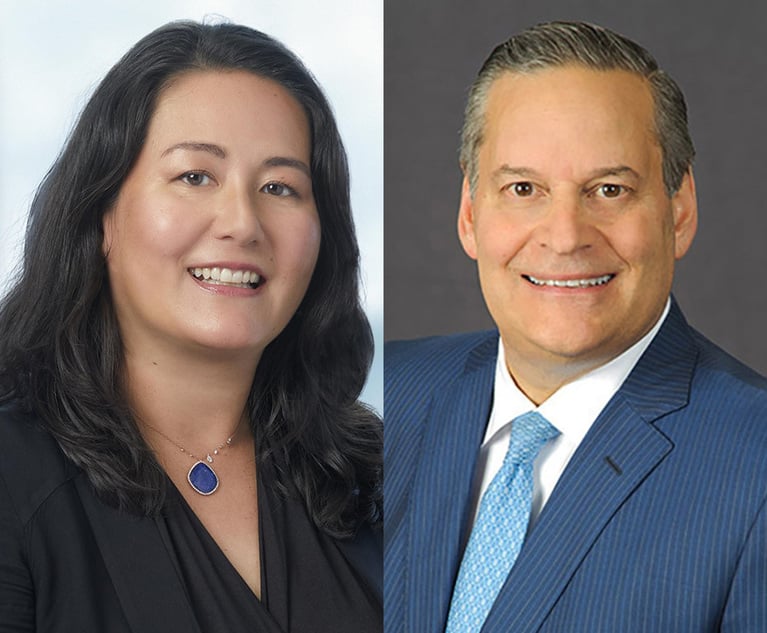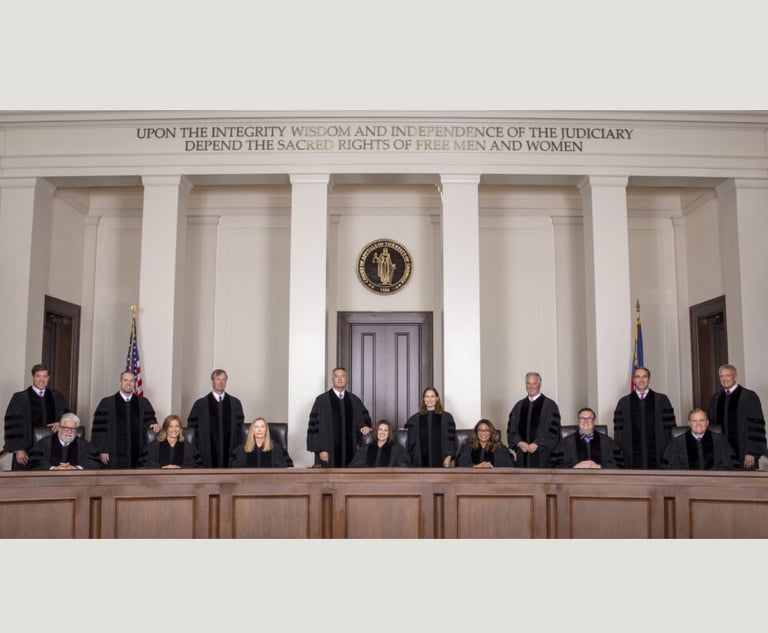 Laura Rashidi-Yazd, Atlanta Legal Aid Society. (Photo: John Disney/ ALM)
Laura Rashidi-Yazd, Atlanta Legal Aid Society. (Photo: John Disney/ ALM)Atlanta Legal Aid Takes On New Foe: Homeowner Tax Hikes
Atlanta Legal Aid is using a major federal grant to expand "limited scope," high-impact volunteer projects, including the property tax aid initiative.
August 16, 2018 at 05:28 PM
4 minute read
The sharp hike in Fulton County property value appraisals and tax assessments, which in some cases doubled, sparked an unprecedented 42,000-plus appeals last month—including dozens from low-income clients of the Atlanta Legal Aid Society who can't afford a larger tax bill.
Legal Aid was able to help them, thanks to an army of volunteer lawyers coordinated by Laurie Rashidi-Yazd, who heads its two-year old pro bono unit.
The property tax aid initiative is the most ambitious example of Legal Aid's expansion into limited scope pro bono projects after a major $421,000 grant from the Legal Services Corp. in 2016 allowed it to create the dedicated pro bono unit.
“We were really lucky to have Laurie and the pro bono unit come in and help us,” said Stacy Reynolds, a staff attorney for the group's Senior Citizens Law Project. “It was an enormous project because it affects all the homeowners in Fulton County.”
Rashidi-Yazd became the new unit's director after heading Legal Aid's Grandparent Adoption Project. She was tasked with identifying and facilitating nontraditional pro bono projects, which led to the tax appeal clinic.
Atlanta Legal Aid has always relied on volunteer lawyers, but traditionally they would take on an entire case for a client, said Kristin Verrill, the director of grants and innovation. “They never know if it will take five or 10 hours—or if it will take 50,” she said.
Offering limited scope pro bono opportunities, which are time-limited and easier on lawyers' schedules, means Atlanta Legal Aid can expand its volunteer lawyer corps and help more clients in high-impact cases, Verrill said.
“These limited scope volunteer opportunities are where we see the growth in our program,” she added.
Taxed Out of Homes
The property tax aid initiative started when a couple of Legal Aid lawyers foresaw back in January that many of the group's clients were at risk of getting taxed out of their homes.
One client had his property assessment double, from $40,500 to $85,100, Reynolds said. That would spike his annual tax payment from under $700 to about $1,500, which she said is more than double his monthly income.
To identify clients at risk, Legal Aid lawyers and staff reviewed 222 cases the group had handled for low-income homeowners and sent them information about obtaining homestead exemptions and other ones available for seniors and the disabled, Reynolds said.
Next they trained and deployed volunteer lawyers to call and verify that clients were receiving their exemptions. Volunteers called again after this year's Fulton assessments went out to tell people they had a right to appeal and how to do it before the July 6 deadline.
More volunteer lawyers are currently on standby to represent clients at appeal hearings, Reynolds said.
“We could only do this project because we had the increased capacity of the pro bono unit,” Verrill said.
“We can model this in other counties, now that we know the model works,” she added.
The pro bono unit, made up of Rashidi-Yazd, a staff attorney and two paralegals, provides a single entry point for Legal Aid volunteers and coordinates its baker's dozen of pro bono projects.
The LSC this month awarded Atlanta Legal Aid a follow-up grant of $371,500 to expand the pro bono initiative. The group is one of only 15 legal aids nationally to land one of the grants from the LSC's Pro Bono Innovation Fund.
“The new grant is to help us break out from that traditional model of taking a case,” Verrill said.
The focus now is creating an online toolkit for staff and volunteers that provides resources for handling large-scale, limited scope projects such as the property tax clinic—and enables lawyers to take on pro bono work for the group from any location.
“We want to make volunteering easier and more accessible. We will find the right fit for you because we have so many opportunities,” Verrill said.
Legal Aid launched an Enhanced Services Project with a separate LSC innovation grant in 2015 to track outcomes for clients that it's served, and Verrill said the toolkit will boost its ability to deploy volunteers who can provide additional advice and services to clients who need them.
This content has been archived. It is available through our partners, LexisNexis® and Bloomberg Law.
To view this content, please continue to their sites.
Not a Lexis Subscriber?
Subscribe Now
Not a Bloomberg Law Subscriber?
Subscribe Now
NOT FOR REPRINT
© 2025 ALM Global, LLC, All Rights Reserved. Request academic re-use from www.copyright.com. All other uses, submit a request to [email protected]. For more information visit Asset & Logo Licensing.
You Might Like
View All
Burr & Forman, Smith Gambrell & Russell Promote More to Partner This Year
7 minute read
Few Atlanta-Centric Law Firms Expected to Pay Associate Bonuses at Market Scale
5 minute read
Experts Not Foreseeing More Rules Governing Prosecutors' Actions After Georgia Court's Removal of DA From Election Case
8 minute read
Trending Stories
Who Got The Work
Michael G. Bongiorno, Andrew Scott Dulberg and Elizabeth E. Driscoll from Wilmer Cutler Pickering Hale and Dorr have stepped in to represent Symbotic Inc., an A.I.-enabled technology platform that focuses on increasing supply chain efficiency, and other defendants in a pending shareholder derivative lawsuit. The case, filed Oct. 2 in Massachusetts District Court by the Brown Law Firm on behalf of Stephen Austen, accuses certain officers and directors of misleading investors in regard to Symbotic's potential for margin growth by failing to disclose that the company was not equipped to timely deploy its systems or manage expenses through project delays. The case, assigned to U.S. District Judge Nathaniel M. Gorton, is 1:24-cv-12522, Austen v. Cohen et al.
Who Got The Work
Edmund Polubinski and Marie Killmond of Davis Polk & Wardwell have entered appearances for data platform software development company MongoDB and other defendants in a pending shareholder derivative lawsuit. The action, filed Oct. 7 in New York Southern District Court by the Brown Law Firm, accuses the company's directors and/or officers of falsely expressing confidence in the company’s restructuring of its sales incentive plan and downplaying the severity of decreases in its upfront commitments. The case is 1:24-cv-07594, Roy v. Ittycheria et al.
Who Got The Work
Amy O. Bruchs and Kurt F. Ellison of Michael Best & Friedrich have entered appearances for Epic Systems Corp. in a pending employment discrimination lawsuit. The suit was filed Sept. 7 in Wisconsin Western District Court by Levine Eisberner LLC and Siri & Glimstad on behalf of a project manager who claims that he was wrongfully terminated after applying for a religious exemption to the defendant's COVID-19 vaccine mandate. The case, assigned to U.S. Magistrate Judge Anita Marie Boor, is 3:24-cv-00630, Secker, Nathan v. Epic Systems Corporation.
Who Got The Work
David X. Sullivan, Thomas J. Finn and Gregory A. Hall from McCarter & English have entered appearances for Sunrun Installation Services in a pending civil rights lawsuit. The complaint was filed Sept. 4 in Connecticut District Court by attorney Robert M. Berke on behalf of former employee George Edward Steins, who was arrested and charged with employing an unregistered home improvement salesperson. The complaint alleges that had Sunrun informed the Connecticut Department of Consumer Protection that the plaintiff's employment had ended in 2017 and that he no longer held Sunrun's home improvement contractor license, he would not have been hit with charges, which were dismissed in May 2024. The case, assigned to U.S. District Judge Jeffrey A. Meyer, is 3:24-cv-01423, Steins v. Sunrun, Inc. et al.
Who Got The Work
Greenberg Traurig shareholder Joshua L. Raskin has entered an appearance for boohoo.com UK Ltd. in a pending patent infringement lawsuit. The suit, filed Sept. 3 in Texas Eastern District Court by Rozier Hardt McDonough on behalf of Alto Dynamics, asserts five patents related to an online shopping platform. The case, assigned to U.S. District Judge Rodney Gilstrap, is 2:24-cv-00719, Alto Dynamics, LLC v. boohoo.com UK Limited.
Featured Firms
Law Offices of Gary Martin Hays & Associates, P.C.
(470) 294-1674
Law Offices of Mark E. Salomone
(857) 444-6468
Smith & Hassler
(713) 739-1250






